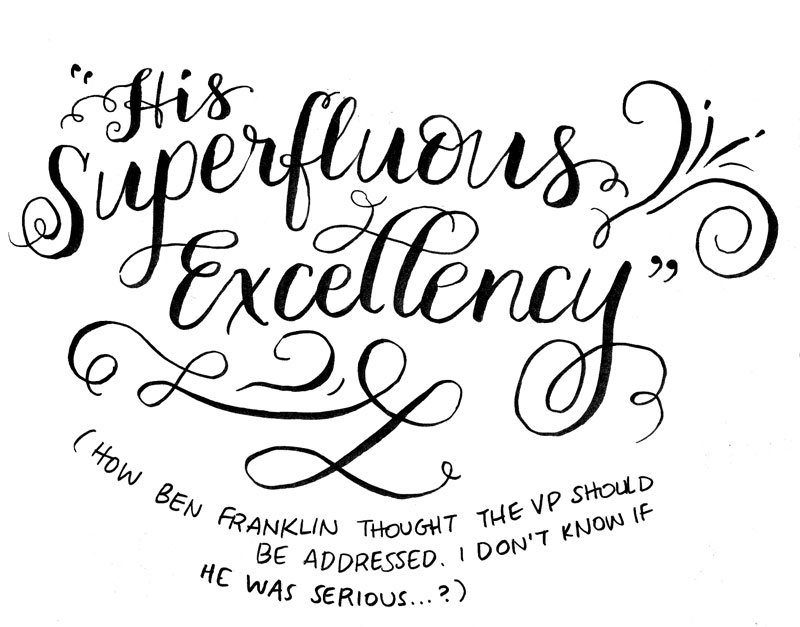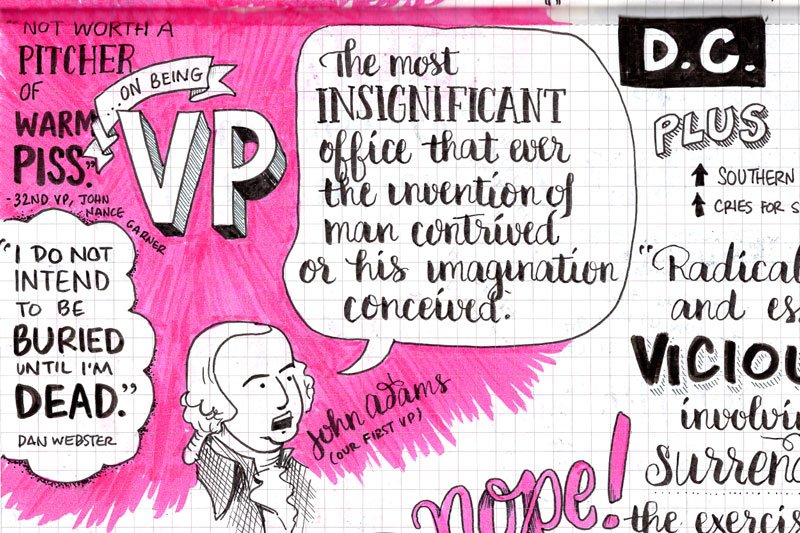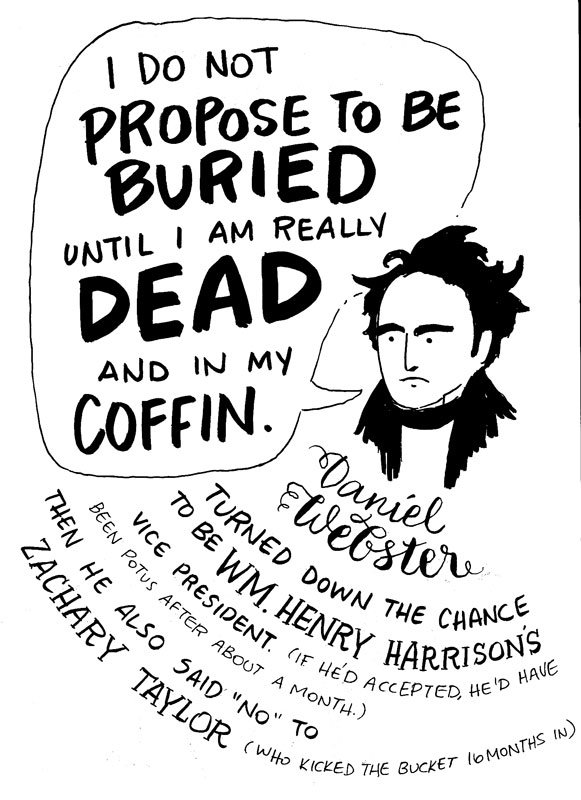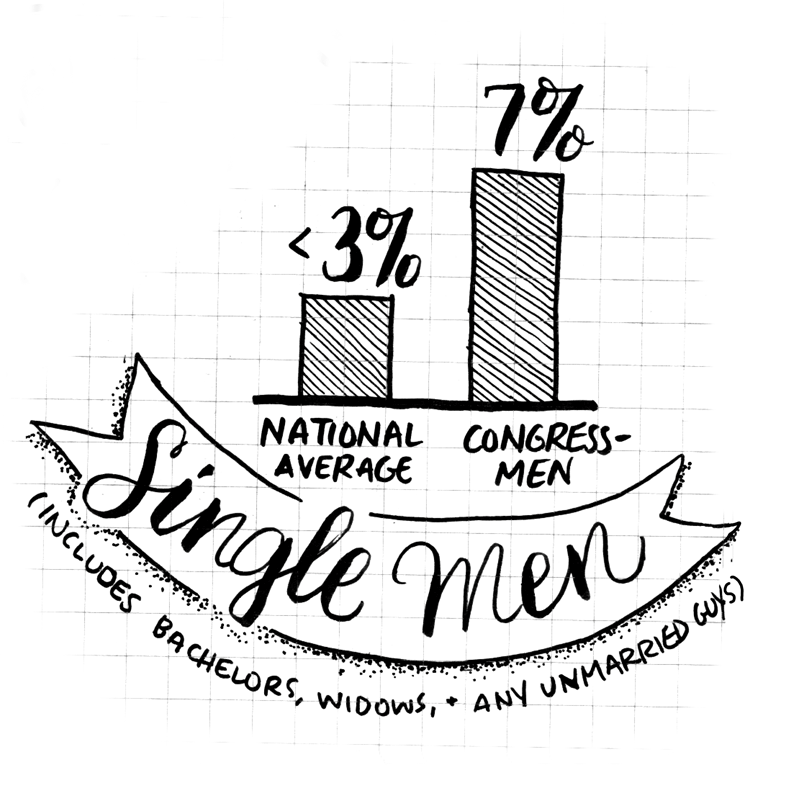Vice President edition
ISSUE NO. 3 // ALL ABOUT THE NO. 2s
I’m pretty psyched about this issue:
I’m sharing a preview of my book for the first time. (Yikes!)
I have a special guest. (A credible, qualified guest!) He’s diving deeper into the only vice president sworn in on foreign soil.
AND I have some facts I can’t wait to share.
Let’s get to it!
Presidential Doodler
PS Check out my vice presidents page for a full list.



I’m thrilled (and super nervous) to pull back the curtain and share a page of the book I’m working on. Ta-da! Check out my VP spread —
Yeah, I know it’s kind of small and hard to read. But if I make it too easy, you won’t need to buy the book!
PS If you do an image search on John Calhoun, be sure to chase it with a search for “young John Calhoun.” A palate cleanser, if you will. It’s poor form to make fun of someone’s appearance, but in his case he deserves it. His outside matched his insides.
I’m thrilled to have a special guest — Dr. Thomas Balcerski, author of Bosom Friends: The Intimate World of James Buchanan and William Rufus King. Keep reading to get to know the vice president with the shortest reign — from an actual expert!
8 THINGS TO KNOW ABOUT WILLIAM RUFUS KING
1 Say his name
His full name is William Rufus DeVane King, though he rarely utilized his mother’s maiden name (DeVane) throughout his lifetime. Instead, he was often referred to in print as “William Rufus King” or “William R. King.” For shorthand, he may be called simply “William Rufus,” as I will do here. For his militia service, he earned the honorary title of “Colonel,” such that he was often addressed as “Col. King” in letters. William Rufus King has often been confused with other politicians from this period. He was NOT Rufus King of New York (1755-1827), who was himself twice an unsuccessful candidate for Vice President, nor William King, governor of Maine (1768-1852). Likewise, King has often been confused with Fernando Wood, mayor of New York City, since the two men shared a certain likeness.
2 His college education and why college dropouts are still eligible to become president
William Rufus King did not complete his college education. Part of the class of 1804 at the University of North Carolina at Chapel Hill, he stopped his schooling a year early to return to his family’s home in Fayetteville to follow agricultural pursuits. The deficiency in his final year of college education did not inhibit his ambitions, for he studied law and was elected to the House of Representatives in 1810 at age 24. Born in April, he was technically too young to serve in Congress when he took his seat the following March, but no one seemed to mind.
3 The potent drug that is the affection of a Russian czarina
William Rufus King served abroad as secretary to the legation to Russia. In that capacity, he was on hand in 1817 for the marriage of future Czar Nicholas I to the Prussian Princess Charlotte (later Alexandra Feodorovna). According to family legend, William Rufus was smitten by the princess and improperly kissed her hand in a receiving line prior to the wedding. Protocol thus breached, William Rufus wondered if he would be in hot water for his actions, but a kind note the next day assured him that all was well. Still, he used the story of this unrequited love in St. Petersburg throughout his life to avoid discussing the topic of his own failure to marry. Instead, William Rufus remained a lifelong bachelor.
4 Bachelor life in Washington D.C. in the “bachelor’s mess”
Along with his more famous counterpart, James Buchanan, William Rufus King was a core member of the Bachelor’s mess that lived together in a Washington, DC, boardinghouse over the years 1834 to 1844. During that ten-year time period, King and Buchanan sought out other like-minded bachelors to create an ideal living situation of about 4 to 5 members of Congress. King and Buchanan became inseparable during this period, as the two men appeared together at various social events around the capital. His friendship with Buchanan ripened into an intimacy uncommon for two politicians; yet, this intimate male friendship conformed to existing patterns elsewhere in the country. When King left for Paris in 1844 to assume the position of Minister to France, his correspondence with Buchanan revealed heartfelt emotions at their separation.
5 A southern gentleman in Paris
William Rufus King served as minister to the royal court of King Louise-Phillippe, who had been sworn in as king in 1830. Louise-Phillipe was often called the “Citizen King” and the “bourgeois monarch.” William Rufus seemed to fit in very well at this court, and he even managed to convince France to remain neutral in the growing conflict between the United States and Mexico. Through the DeVane side of his family, William Rufus had French Huguenot ancestry, and he used these connections to his advantage at court. William Rufus returned home in 1846, while Louise-Phillipe abdicated the throne in 1848 as part of a series of revolutions that swept Europe in that year.
6 Everyone loves William Rufus
William Rufus King served in the United States Senate from 1819 to 1844—the longest such continuous term of any senator until that point—at which point he resigned his seat to become Minister to France. Immediately upon his return to the United States in 1846, William Rufus sought out his old position, only to find opposition from fellow Democrats in Alabama. By chance, a seat became vacant in 1848, and he secured another term in the Senate. Having already acted for nearly five years as President Pro Tempore, he was once again chosen for the role in 1850 during the contentious debates taking place in Congress. King’s steady hand in the presiding officer’s chair paved the way for the compromise measures that followed.
7 Alabama’s only vice president
The Democratic Party had lost the presidential election of 1848, but President Zachary Taylor’s sudden death in 1850 opened the door wide open. A “dark horse” candidate emerged at the 1852 Democratic National Convention, Franklin Pierce of New Hampshire, who had served in the Senate with James Buchanan and William Rufus King years earlier. As a consolation prize to the Buchanan faction of the party, William Rufus was selected as Pierce’s running mate. The two men hardly spoke during the campaign or thereafter, which was common practice in the nineteenth century. Pierce and King were elected in a landslide that November.
8 King’s end
During the campaign of 1852, William Rufus King was suffering from tuberculous, which was then an incurable condition for most afflicted by the disease. In a last act of desperation, the vice president-elect fled the country for Matanzas, Cuba, to breathe the sweet air of the sugar plantations of the region. By a special act of Congress, he was permitted to be inaugurated while in Cuba, making him the only president or vice president ever to take the oath of office on foreign soil. Nothing could save him, however, and he died on April 18, 1853. His last words were reportedly: “Hush, let me pass quietly.” His remains were initially interred at his family’s plantation at King’s Bend, only to be exhumed and reinterred at his present resting place at Live Oak Cemetery in Selma.
____________
Thomas Balcerski is Associate Professor of History at Eastern Connecticut State University. A scholar of early American history, he holds a Bachelor of Arts degree from Cornell University, a Master of Arts degree from the State University of New York at Stony Brook, and a Ph.D. in history from Cornell University. He has been featured on the C-SPAN series, “Lectures in History,” for his work on antebellum political culture and for his book, Bosom Friends: The Intimate World of James Buchanan and William Rufus King.
Like what you see here?
Consider signing up for The POTUS Notice. My free monthly email newsletter goes out the first Saturday each month. Occasionally, I also send a bonus Presidential Briefs email. No more than two emails a month, I promise. The POTUS Notice contains additional content not necessarily repeated in the blog. And it generally looks cooler, too. Plus, subscribers get a free trading card and chances to score POTUS merch!
Follow along on Instagram for more doodles and presidential trivia.

















